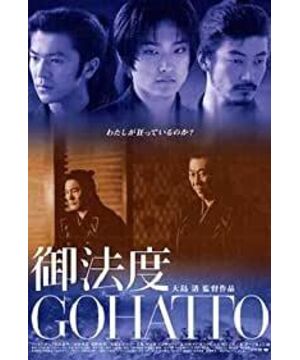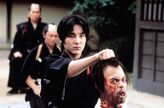In 1999, Nagisa Oshima had to complete the filming in a wheelchair because of a cerebral hemorrhage a few years ago. Perhaps, with the growth of age, especially the sharp decline in health, the director himself is obviously more chilling and concise when expressing the erotic part of the film; on the contrary, the expression of the desire for death has become stronger and stronger.
Not only did I feel this way while watching it, but there is such an anecdote to illustrate this point. It is rumored that the director invited Ryuichi Sakamoto to participate in the filming, but the professor said, "This story scares me, so this time I only make music." Things can also illustrate this point. It was rumored that the director had invited Ryuichi Sakamoto to participate in the filming, but the professor said, "This story scares me, so this time I only make music."
This movie gave me a long-awaited viewing tremor. It has the beauty of fresh bamboo shoots boiled in salt water, which is clear and clean, and shows the undercurrent of lust in a crystal clear, unconventional manner.
Why do you think it is boiled fresh bamboo shoots in salt water? When I was young, the elderly in my family often said that bamboo shoots are the cleanest food. The freshly dug up tender bamboo shoots have a slight bitterness in their fragrance. They are not dry ingredients. They are moist, but they will not overflow with juice. It is just like the long-lasting love in the movie. It is also like a 15-year-old. The beautiful boy played by Ryuhei Matsuda.
Just the simplest cooking, you can get the most beautiful taste. The wisdom of this diet follows the same profound meaning as the narrative style of this film. The last movie that left such an impression on me was Hou Hsiao-hsien's "Assassin Nie Yinniang".
But what's even better about "Yufadu" is that the whiteness of its artistic techniques is to tell the redness of the story itself; such a contrast turns a hot story full of erotic murders into a solitary mist on a barren mountain. grave.
The Imperial Code turns red into a cool color.
In the last climax scene of killing and being killed in Ghana, the director shot a total of 16 minutes, which is quite heavy for a feature film that is less than 100 minutes long. However, in these 16 minutes, Garner's real appearance was only 3 minutes, and the remaining 13 minutes were all the conversations between Hijikata (Take Kitano) and Okita (Takeda Shinji) around Garner.
The two, who knew what was going to happen next, chatted about a strange novel "The Alliance of Chrysanthemums" that Okita had recently read while recovering from an illness. The strange story comes from "The Story of the Rainy Moon", which tells the story of a samurai who sacrificed his life in a crisis so that his undead could rush to make an appointment with a friend. Okita said that he thought it was a story about a man's sexuality.
This dialogue between the two not only added a ghostly atmosphere to Garner, but also completely broke the anti-Bushido attitude of the entire film. The focus is especially on the former.
Pygmalion in Greek mythology, because he didn't like mortal women, carved a beautiful girl statue out of ivory, and gave all his energy, all his enthusiasm and all his love to the statue.
Director Nagisa Oshima did exactly the same thing as Pygmalion. "Godfa" is a movie that exists for Ghana alone, Matsuda Ryuhei is the ivory used for carving, and the final shape of Ghana is the sculpture Galatea.
Nagisa Oshima used "The Imperial Law" to satisfy his love for the perfect boy in his heart. He tried his best to create a kind of beauty, and hinted to everyone that this is inhuman beauty.
Garner, the character who never existed as a normal human being, is the perfect embodiment of great beauty and great evil. On the one hand, his beauty caused the entire organization to fall into a whirlpool of lust; on the other hand, this beautiful boy had an inexplicable hobby of killing from the very beginning. Even though he was in danger of dying several times, death brought him not fear, but excitement.
When Garner resisted Tashiro's katana with his bare hands, he pursed his lips and smiled, and his expression was full of coquettishness.
It can be said that pornography and death are dual ways to stimulate Ghana's pleasure. So while Ghana continues to satisfy our aesthetic needs, it also constantly tortures our sense of morality.
The taboo pleasure he brought us, the temptation of "doing it when you know it can't be done", came to a climax and came to an abrupt end with Garner's scream outside the painting. At the same time, in the picture, the earthwork cut off a small tree full of white flowers, and the colorful and lush canopy fell to the ground, leaving only scattered petals in the air.
Garner's death, using such a ghostly scene as a metaphor, became the last temptation for us.
Similar aesthetics are particularly evident in Nagisa Oshima's "The World of the Senses".
I think what the director is looking for is to make beauty just what we can afford, the beginning of terror.
All the pictures in this article are taken from the movie "The Imperial Law"
© Copyright of this article belongs to the public number Lunar Journey (SpaceOddity-)
For any form of reproduction, please contact the author.
View more about Taboo reviews











